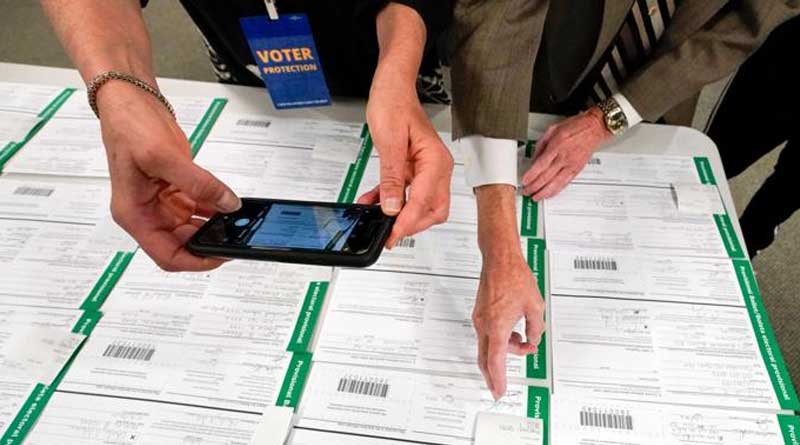Photo: A canvas observer photographs Lehigh County provisional ballots as vote counting in the general election continues, Friday, Nov. 6, 2020, in Allentown, Pennsylvania.
Photo Credit: Mary Altaffer
The Center Square [By Chris Krug]-
So here it is nearly two weeks past Election Day and the 2020 presidential race remains undetermined.
I think that was somewhat foreseeable. Despite the polls, which were again wildly off and may ultimately be the end of the polling industry, most people I have spoken with about the election over the past year thought this would be a close race no matter who ran against incumbent Republican Donald Trump.
Only people who bought the baloney on the polls believed that the Democrats would roll in a landslide. And any Republican voter who thought that Trump was on easy street against a candidate such as former Vice President Joe Biden, who in three previous tries never generated any electricity among the voting populace, was equally as misguided.
Nearly 150 million votes have been tabulated, and the results continue trickling in. We already have seen more votes cast in this election than any other election in U.S. history – and by a wide margin. Voting, despite COVID-19, and against any past precedent, exploded.
That’s great for democracy, if the votes are legitimate. And that remains a point of question that we all should be asking, not only those who voted for Trump. The validity of an election, succinctly, is the election.
So amid what feels to so many Americans as an unwillingness to explore election protocols and integrity by all of the national television networks, metropolitan newspapers and amplified in endless hours of cable-news opining, we should be willing to do what’s uncomfortable and dig deeper.
If Biden ultimately is declared the winner of an election with inherent voting and vote-tabulation problems, it’s not a win for the country. And if there remains any doubt that he won fairly against Trump, I fear the ramifications of such a victory will prompt more unrest in a nation whose wounds from the mostly peaceful protests that ended in shootings, fires and damage to public and private property will persist or worsen.
Can you imagine what the backlash in this country would look like if the other side rose up like the protesters did over the past several months? Do we want that? Are we all looking for something that edges toward widespread civil unrest in the United States? I don’t even want to think about it, to be candid. But we all must. And the media has to play its part.
It is with that in mind that I struggle with national media outlets attempting to put the election aside and simply carrying on without digging deeper into the vote itself and the methodology of vote tabulation. It would seem reasonable that a truly centrist media company would be digging now – whether they serve millions of viewers via broadcast or hundreds of readers through their weekly deadwood editions.
The push for such inspection and consideration just isn’t there. It is not widespread in media. In fact, it absolutely feels as if a contradictory sentiment among media has settled on this issue. It feels as if newsrooms that have the capacity to invest resources in deeper scrutiny of the elections are writing stories and broadcasting segments on how the vote was all good – that there is nothing to see here. That is such an odd posture for media coverage of anything, let alone a presidential election. I get it, a lot of people despise Trump. But that shouldn’t matter. And, again, nearly half of the 150 million voters will view the outcome of this election as consequential simply because the Democrat and Republican platforms are so widely varying and the ramifications of either party winning so deeply impactful.
We are still weeks away from certification of the votes, and votes continue to be counted or, in the case of Georgia, recounted by hand.
By law, an election isn’t over until it’s certified. We saw this in 2000, when Republican George W. Bush defeated then former Vice President Al Gore in a painfully examined race that came down to dimpled and hanging chads in Florida some 34 days after the election.
The Associated Press or any of the other big media companies can “call” a race – any race, really. And the others may follow, independently or in unison with The AP. But the election isn’t finished until it’s certified. That is something that all Americans deserve, and – although an arduous and challenging task for newsrooms whose numbers have dwindled as a consequence of brutal shifts in media revenues – that our news providers should be committed to providing.
It should matter to far more media companies than the scant few who are openly interested in seeking the clearest truth in the outcome of the deepest presidential election in our nation’s 244-year history.



